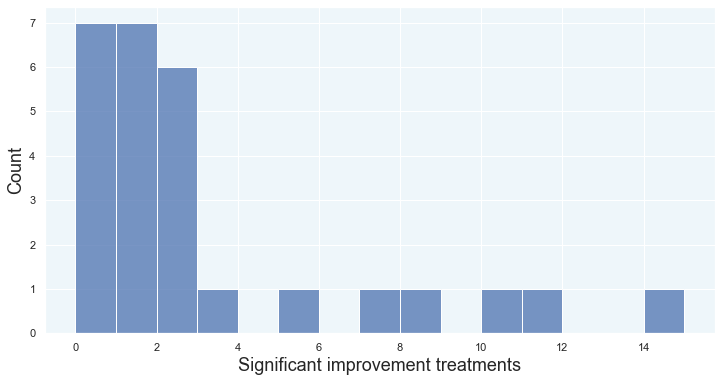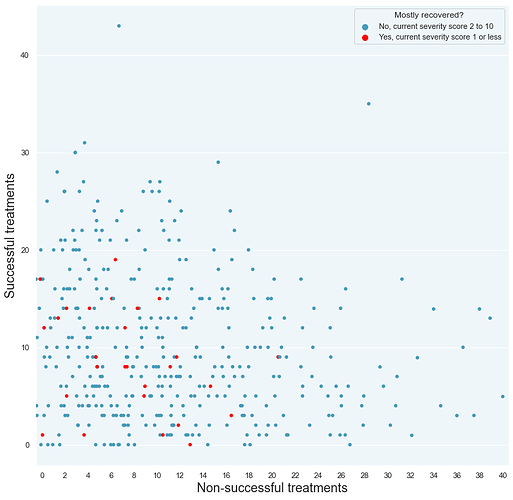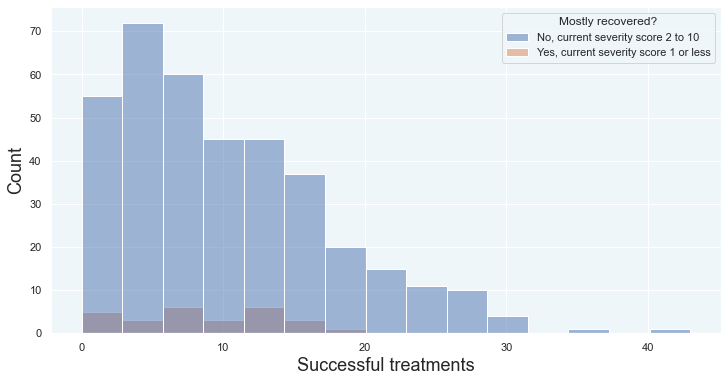The current evidence (weakly) suggests that trying many treatments at once does not lead to recovery. That type of medicine doesn’t really seem to work that well. Getting off unnecessary supplements and medications may help patients (A) save money and (B) reduce the chances of drug interactions.
Most supplements don’t do anything?
Supplements are extremely popular among chronic illness patients. They are likely a little more popular than going to the conventional healthcare system. The chart below shows that popularity of the most successful supplements ranged from 21% to 79%.
As far as efficacy goes, most of these treatments don’t look like they do much. Perhaps the top supplements like melatonin (prescription drug in some countries), magnesium, quercetin, and ALA do something… though the chances of those supplements doing something is really low.
Most of the people who recovered reported that very few or no drugs helped them a lot
20/27 people who mostly recovered (74%) reported that 0-2 treatments lead to a significant improvement. So, most of the people (about 3 out of 4) who recovered didn’t find multiple treatments to be helpful.
How most people recovered
On average, the people who mostly recovered tried fewer treatments. It’s somewhat hard to see in the graph below but the red dots are spread out less than the blue dots. (Blue = not mostly recovered.) Skip ahead for a somewhat cleaner visualization.
The orange bars show mostly recovered patients. They didn’t report as many ‘significant improvement’ treatments as the non-recovered patients, though there is a range.
Those who mostly recovered tended to report fewer successful treatments (and to try fewer treatments). Successful = some type of improvement, significant or mild. However, both groups had many people who reported many successful treatments.
Certain drug combinations
Statins + maraviroc didn’t lead to any recoveries. So the Bruce Patterson theory doesn’t seem to be panning out.
Triple anticoag didn’t seem to lead to any recoveries. However, clopidogrel by itself may do something.
Currently popular theories didn’t stack up very well versus HBOT.
see slide 48 and 49 in https://www.longhaulwiki.com/resources/assets/Data-Driven-Treatment-November-2022.pdf
It’s possible that we’ll discover some synergistic drug combinations in the future. Black seed oil + ivermectin may be one of them (though I don’t think it’s the case for me). However, there isn’t enough data right now.
Effective and ineffective styles of medicine
There are people who are into trying a big stack of supplements. This probably doesn’t work too well because most supplements aren’t among the top treatments (HBOT, statins, ivm, hcq, black seed oil, extended fasting). Black seed oil is the only supplement on that list. The black seed oil has to be a higher dose associated with using the oil form of that supplement and not the capsules or seeds.
The alternative medical system has mostly been superior to the conventional medical system. Only hydroxychloroquine (Plaquenil) is something that you would get from the conventional medical system as it is used for some autoimmune conditions.
Among the alternative medical system, there are a lot of practitioners who like to prescribe multiple drugs at once. They have a bunch of top-down theories and that’s how they prescribe. See some of the freedom movement doctors, Bruce Patterson’s group, etc. That approach doesn’t seem to work that well as covered in the previous section.
The people who are recovering are mostly doing things on their own. I’m one of those people and I didn’t know a lot when I recovered (I wasn’t aware of data back then). HBOT is something that you get on your own- doctors usually don’t know about it being the most proven treatment for Long COVID and won’t help you get it. The same applies for extended fasting, which most doctors don’t know about (though it’s been around for a while as it helps with autoimmune conditions).
What really seems to work are antimicrobials. Out of the top 6 treatments, extended fasting is the only one that isn’t known for having antimicrobial effects (though it will affect your gut microbiome in a big way so you could argue it’s an antimicrobial). So focusing on those treatments may really cut down the time needed to figure out what treatment(s) will help you recover. Many antimicrobials aren’t popular right now so not a lot of people are talking about them. However, they’re leading the way in terms of recovery.





